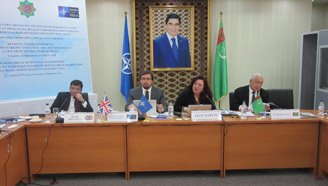Turkmenistan and NATO hold forum on regional peace and stability
Experts from five Central Asian states and Afghanistan gathered in Ashgabat for a NATO-sponsored regional conference on “Peace and Stability in Central Asia and Afghanistan: A View from Neutral Turkmenistan” on 2 and 3 March 2015.

This high-level event, organised jointly by the Ministry of Foreign Affairs of Turkmenistan and the office of the NATO Liaison Officer in Central Asia, was unprecedented in the history of Turkmenistan's partnership with the Alliance.
It was the fourth in a series of NATO-sponsored events marking the 20th anniversary of the Partnership for Peace programme in the Central Asian partner states. Moreover, it was included in Turkmenistan's official programme of events celebrating the "Year of Neutrality and Peace" on the 20th anniversary of the United Nations General Assembly Resolution recognising the country's neutrality.
Turkmenistan's Deputy Foreign Minister Berdyniyaz Myatiev opened the event, while the NATO Secretary General's Special Representative for the Caucasus and Central Asia, James Appathurai, addressed participants by video link from NATO Headquarters.
Turkmen participants included officials and experts from a wide range of institutions, including the Ministry of Foreign Affairs, Ministry of Defence, Ministry of Interior, Prosecutor-General's Office, the Institute of State and Law under the President of Turkmenistan, the Institute of International Relations and the International University of Humanities.
Experts from Afghanistan, Kazakhstan, Kyrgyzstan, Tajikistan, Uzbekistan and the United States, and representatives of the United Nations Regional Centre for Preventive Diplomacy for Central Asia, the United Nations Development Programme, the European Union, and the Organization for Security and Co-operation in Europe, also spoke at the event.
Perspectives on regional security issues

Ambassador Sapar Berdyniyazov, Special Envoy of the Ministry of Foreign Affairs of Turkmenistan, underlined Ashgabat's neutral status and transparent foreign and defence policies, saying that these have helped it gain the trust of its neighbours and allowed it to act as a platform facilitating the prevention and resolution of conflict. He also recalled Turkmenistan's support for the stabilisation of neighbouring Afghanistan, both bilaterally and multilaterally, through the Heart of Asia/Istanbul Process.
Dr Shahrbanou Tadjbakhsh (Professor at the Institut d'Etudes Politiques de Paris, France and Researcher at the Peace Research Institute Oslo, Norway) noted that all countries are facing similar threats. However, the means they use to tackle these are different, and their effectiveness debatable: "It would be natural to have regional cooperation, however, it is far from perfect in Central Asia," she said.
Also arguing for greater regional cooperation among Central Asian states, Dr Ulugbek Khasanov (Associate Professor at the University of World Economy and Diplomacy, Uzbekistan) stated that "we are all faced with non-state threats, which no state in the region is able to deal with on its own."
Dr Kuralai Baizakova (Professor at Al-Farabi Kazakh National University, Kazakhstan) noted that "the degree of importance of common threats is perceived differently by different Central Asian states." She advocated the development of new regional mechanisms, for instance, on sharing water resources, which could become a factor for rapprochement in Central Asia.
Elnura Omurkulova-Ozierska (Researcher at the National Strategic Studies Institute, Kyrgyzstan) highlighted the increasing threat to Central Asian security posed by radicalisation, while warning that harsh counter-terrorism policies adopted by some countries can be counter-productive.
Bakhtiyor Rakhmonov, an independent expert from Tajikistan, recalled Turkmenistan's role as the first platform for three rounds of negotiations between the parties to Tajikistan's Civil War (1992-1997), which made an "invaluable contribution" to ending this conflict. He also expressed the hope that the international community would assist Tajikistan in strengthening the security of its long common border with Afghanistan.
Haroun Mir (Director of the Centre for Research and Policy Studies, Afghanistan) praised the international community's enormous contribution to Afghanistan, which today is a democracy enjoying freedom of speech. While he saw 2015 as a major test of the ability of the Afghan National Security Forces to ensure security throughout the country, he also highlighted a window of opportunity for national reconciliation, expressing the hope that this year would witness a breakthrough in the Afghan peace process.
The NATO Liaison Officer in Central Asia, Alexander Vinnikov, outlined NATO's continued engagement with Central Asian partners and commitment to Afghanistan. While the NATO-led ISAF operation was completed in December 2014, support for the further development of Afghan security forces and institutions and wider cooperation with Afghanistan continue, as outlined at NATO's Summit in Wales in September 2014.
Participants also exchanged views about the threat posed by radicalisation and the so-called Islamic State of Iraq and the Levant (ISIL); bilateral border and energy-related tensions between Central Asian states; the narcotics problem and the importance of tackling it effectively; and other security-related challenges including recent events in Ukraine and the accompanying "information war", labour migration and the impact of the Russian economic crisis on Central Asia.
Media links
English:
- http://www.mfa.gov.tm/en/news-en/2574-regional-expert-conference-on-issues-of-peace-and-stability-was-held-at-ashgabat
- http://www.turkmenistan.ru/en/articles/17871.html
- http://akipress.com/news:556255/
- http://www.silkroadreporters.com/2015/03/04/central-asia-afghanistan-security-discussed-in-ashgabat/
Turkmen:
- http://www.mfa.gov.tm/tm/news-tm/2572-asgabatda-parahatcylyk-we-durnuklylyk-meseleleri-boyunca-sebitleyin-bilermenlerin-maslahaty-gecirildi
- http://www.turkmenhabargullugy.com/haber.php?haber_id=2777
Russian:
- http://www.mfa.gov.tm/ru/news-ru/2573-2015-03-03-12-45-53
- http://www.ambturkm.org.ua/index.php?option=com_content&view=article&id=4517:2015-03-03-08-20-44&catid=2:2011-02-18-13-16-36&Itemid=2
- http://www.turkmenistan.ru/ru/articles/40536.html
- http://russian.news.cn/world/2015-03/03/c_134034017.htm
- http://www.turkmeninform.com/ru/news/20150304/09107.html
- http://turkmenistanlive.com/2015/03/04/в-ашхабаде-прошел-крупный-форум-экспе/
- https://ca-news.info/2015/03/04/8
- http://avesta.tj/sociaty/31071-v-ashhabade-prohodit-regionalnaya-konferenciya-po-voprosam-mira-i-stabilnosti.html
